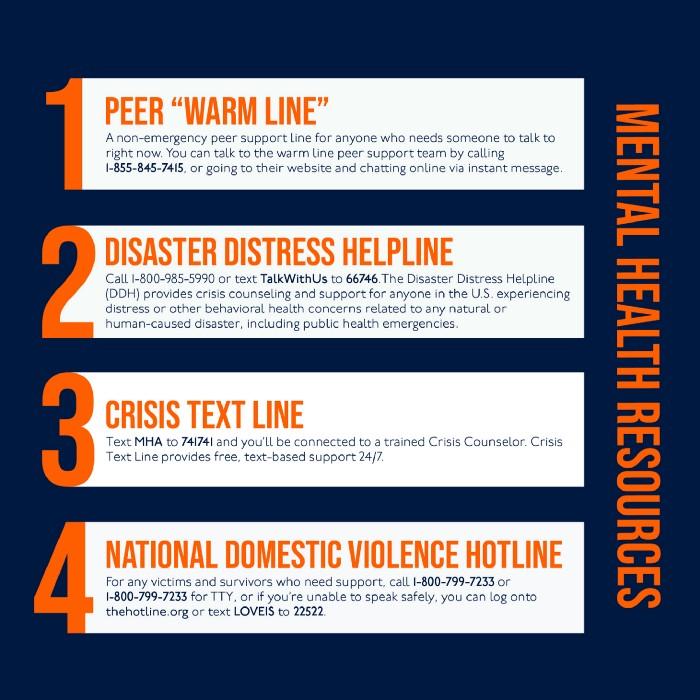Mental Health
Mental Health During COVID-19
From the Office of Senator Scott Wiener (D-San Francisco)
There are many resources out there that can be helpful for those struggling with mental health challenges right now. Even if you don’t have a specific mental health condition, everyone struggles, and everyone needs support. The resources listed below are intended to be helpful but, of course, do not serve as medical advice. As always, if you are experiencing a mental health emergency, please call 911. And if you are experiencing serious mental health challenges, please get in touch with a physician or therapist as soon as possible.
Resources
1) Peer “Warm Line”
Last year, Senator Wiener and Assemblymember Phil Ting championed funding for a warm line, which is now up and running and a great resource. Instead of a hotline, which is for emergencies, a warm line is a non-emergency peer support line for anyone who needs someone to talk to right now. The people who staff the warm line have had their own mental health challenges, so they understand on a very personal level what it means to struggle. You can talk to the warm line peer support team by calling 1–855–845–7415, or by going to their website and chatting online via instant message.
2) Struggling to work from home?
For those of us lucky enough to be able to work remotely, it can still be challenging to adjust to working from home. It can be especially hard if you have a small space, have kids, or are sharing a space with roommates or a partner who are also working from home.
This Forbes piece does a good job laying out some of the impacts that working from home can have on your mental health. The Center for Workplace Mental Health has a great list of resources for anyone who is looking for guidance on how to improve your mood and productivity while working from home.

3) Hotlines
There are many important and helpful hotlines for those experiencing specific mental health challenges who need immediate assistance. This list from Mental Health America is very helpful:
Disaster Distress Helpline
Call 1–800–985–5990 or text TalkWithUs to 66746.The Disaster Distress Helpline (DDH) provides crisis counseling and support for anyone in the U.S. experiencing distress or other behavioral health concerns related to any natural or human-caused disaster, including public health emergencies.
Crisis Text Line
Text MHA to 741741 and you’ll be connected to a trained Crisis Counselor. Crisis Text Line provides free, text-based support 24/7.
The Trevor Project
Call 1–866–488–7386 or text START to 678678. A national 24-hour, toll free confidential suicide hotline for LGBTQ youth.
Dial 2–1–1
If you need assistance finding food, paying for housing bills, accessing free childcare, or other essential services, visit 211.org or dial 211 to speak to someone who can help. Run by the United Way.
National Domestic Violence Hotline
For any victims and survivors who need support, call 1–800–799–7233 or 1–800–799–7233 for TTY, or if you’re unable to speak safely, you can log onto thehotline.org or text LOVEIS to 22522.
Caregiver Help Desk
Contact Caregiver Action Network’s Care Support Team by dialing 855–227–3640. Staffed by caregiving experts, the Help Desk helps you find the right information you need to help you navigate your complex caregiving challenges. Caregiving experts are available 8:00 AM — 7:00 PM ET.
4) Struggling with Substance Use Disorder/Addiction?
If you’re living with a substance use disorder, Nora’s blog on the National Institute on Drug Abuse (NIDA) has really helpful resources regarding how those living with addiction might be particularly impacted by COVID-19. If you are an opioid or methamphetamine user, you might be particularly at risk if you contract COVID-19 and should seek medical attention immediately if you are experiencing symptoms.
The NIDA also has an incredible PDF filled with resources for those looking to seek virtual support for addiction, like virtual meetings, online recovery support communities, and other recovery resources.
This blog post from Shatterproof is also helpful for anyone in recovery struggling with a new routine or lack of structure due to the stay-at-home order.
5) Seeking therapy
Therapy can be so helpful right now, especially if you’re feeling isolated. You can find a therapist and set up remote sessions using Psychology Today, which lists therapists in the area. Some health insurance covers traditional talk therapy, and on this site you can sort through the list of therapists by whether or not they accept your insurance provider.
If you cannot afford therapy, are uninsured, or your insurance doesn’t cover therapy, you can look into sliding scale therapy. These options are often cheaper and providers will assess your financial need and provide a fee accordingly. The San Francisco Cognitive Behavioral Therapy Center has a good list of sliding scale and low cost therapy providers. The Integral Counseling Centers in San Francisco (sliding scale) are accepting new telehealth patients right now.
6) Supporting kids and teenagers
For kids or teenagers, staying home from school and getting out of a normal routine can be very challenging. This is also a very stressful time for so many families, financially and otherwise.
The CDC compiled a helpful list of tips and resources for kids during emergencies.
